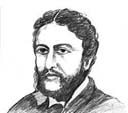
Madhusudan Datta was born in 1824; Sagardari, Bengal, India, which is now in Bangla Desh.
He was educated at the Hindu College, Calcutta which was at the time the cultural home of the Western-educated Begali middle class. In 1843 he became a Christian and changed his name to Michael Madhusudan Dutt.
Dutt had a dynamic if rather erratic personality and an original genius of the highest order. Intellectually, he was a rebel and a product of the Bengal Renaissance, and challenged much of the value system encoded in traditional literature; a gifted linguist, he taught himself several Oriental and Occidental languages, and was well-read not only in English literature, but also in other European literatures, including the Greek and Latin classics.
Though he was a naturally talented writer his earlier compositions in English were unsuccessful and so he turned to Bengali. He was in an excellent position to mediate many new foreign influences to Bengali letters.
He made courageous innovations of forms and types which altered the whole course of Bengali literature and added new dimensions to it. He experimented ceaselessly with diction and verse forms, and it was he who introduced amitraksar (a form of blank verse) the Bengali sonnet and many original lyric stanzas. In introducing blank verse he gave to Bengali poetry a music that was as rich as it was novel. He gave Bengali literature not only its blank verse and the sonnet but also its first modern comedy and tragedy, and its first epic. He introduced a heroic note into Bengali poetry which gave it a power and weight, a richness and elevation, it never had before.
He was an important pioneer in dramatic writing; he wrote a grand heroic-tragic epic in nine cantos which is quite unique in the body of Bengali literature; inspired by Ovid, he wrote poems about the sorrows and hurts of love spoken by women in an epistolary or dramatic monologue mode.
His first Bengali poem Tilottamasambhab based on the Puranic story of the war waged on the gods by the demon brothers Sunda and Upsunda appeared in 1859 or 1860.
The years 1861-62 were Madhusudan’s most fruitful period. they were the year of publication of Meghnad-vadh, Krishnakumari, Vrajangana, and Virangana. Virangana was modelled on Ovid’s heroic epistles, and contains some of Madhusudan’s finest blank verse. Technically it is his best work.
He died in Calcutta, India.
Biograhphy From oldpoetry.com
